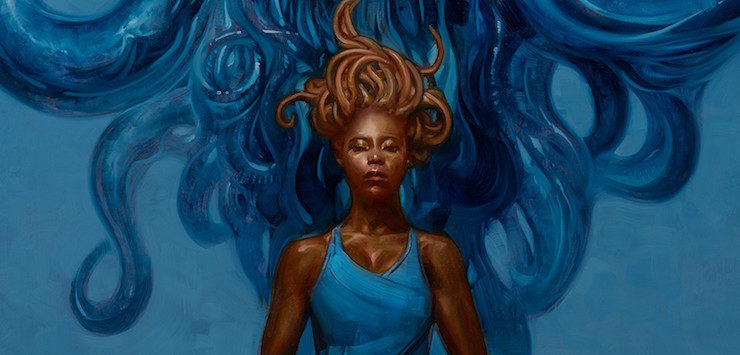After fighting in the Trojan War, taking an epic walk to Mount Doom, or communing with the alien Meduse, all the intrepid war hero/quester/intergalactic exchange student wants is to return to the familiar comforts of home. But they’ve changed—maybe they’re missing a finger, have been transformed on a molecular level, or simply had their mind expanded in the figurative sense—and so has home. These nine sci-fi and fantasy tales explore the awkward, anticlimactic, and occasionally antagonistic homecomings, and how sometimes that final hurdle is the most important part of the story.
The Odyssey by Homer
 After outsmarting the Cyclops, dodging the affections of Circe (OK, he stayed on her island for a little while), and steering clear of Scylla and Charybdis, you can’t blame Odysseus for wanting a low-key return to Ithaca after the Trojan War and his ten-year (!) journey home. Instead, he finds that his wife Penelope has been set upon by a number of unruly suitors intent on competing for her hand. Even though she has kept them at bay with a fabricated story about needing to weave her father-in-law’s burial shroud, the louts have been partying in Odysseus’ home and drinking all of his wine in the meantime. Considering that he’s a war hero and managed the worst return trip from hell, Odysseus makes short shrift of murdering all of the suitors through an archery contest-turned-bloodbath. But still, by the time you get home you just want to put your feet up, you know?
After outsmarting the Cyclops, dodging the affections of Circe (OK, he stayed on her island for a little while), and steering clear of Scylla and Charybdis, you can’t blame Odysseus for wanting a low-key return to Ithaca after the Trojan War and his ten-year (!) journey home. Instead, he finds that his wife Penelope has been set upon by a number of unruly suitors intent on competing for her hand. Even though she has kept them at bay with a fabricated story about needing to weave her father-in-law’s burial shroud, the louts have been partying in Odysseus’ home and drinking all of his wine in the meantime. Considering that he’s a war hero and managed the worst return trip from hell, Odysseus makes short shrift of murdering all of the suitors through an archery contest-turned-bloodbath. But still, by the time you get home you just want to put your feet up, you know?
Binti: Home by Nnedi Okorafor
 In Binti’s eponymous first tale, the young gifted mathematician makes the choice to travel from her home on Earth to Oomza University without telling her family that she even applied in the first place. When her transport is attacked by aliens called the Meduse, it is Binti’s ability to communicate with them that results in a cessation of hostilities between humanity and the species… but the experience leaves Binti radically changed, even physically. After spending a year at university, a simmering rage begins to build in her that she cannot understand or explain away, prompting Binti to think about the home she left behind. She decides to take a pilgrimage back to be cleansed, hoping that her return will give her answers and calm her anger. Her Meduse friend Okwu accompanies her as ambassador for his people, and together they journey back to discover whether Binti can still claim a home in the land where she was raised.
In Binti’s eponymous first tale, the young gifted mathematician makes the choice to travel from her home on Earth to Oomza University without telling her family that she even applied in the first place. When her transport is attacked by aliens called the Meduse, it is Binti’s ability to communicate with them that results in a cessation of hostilities between humanity and the species… but the experience leaves Binti radically changed, even physically. After spending a year at university, a simmering rage begins to build in her that she cannot understand or explain away, prompting Binti to think about the home she left behind. She decides to take a pilgrimage back to be cleansed, hoping that her return will give her answers and calm her anger. Her Meduse friend Okwu accompanies her as ambassador for his people, and together they journey back to discover whether Binti can still claim a home in the land where she was raised.
The Sparrow by Mary Doria Russell
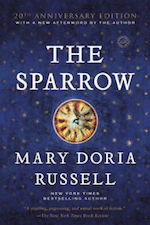 Imagine your (very bad) reputation preceding your return, and everyone at home getting years to stew on it before you set foot back on Earth to defend yourself from the hearsay. Father Emilio Sandoz leaves his home planet in 2019, imbued with faith and the knowledge that he and his fellow crew members are doing a great thing by exploring the distant planet of Rakhat; in 2059, Sandoz returns alone, the sole surviving member of the mission. Even more damning, the UN team who fetched him found him in Rakhat’s prisons, a ruined man: rumored to have prostituted himself to his alien captors, and so crazed by grief and trauma that he murders someone in front of their eyes. Sandoz’s homecoming is neither joyous nor triumphant, as the Vatican shields him from public eyes—the better to interrogate him relentlessly about how the mission could fail so horribly.
Imagine your (very bad) reputation preceding your return, and everyone at home getting years to stew on it before you set foot back on Earth to defend yourself from the hearsay. Father Emilio Sandoz leaves his home planet in 2019, imbued with faith and the knowledge that he and his fellow crew members are doing a great thing by exploring the distant planet of Rakhat; in 2059, Sandoz returns alone, the sole surviving member of the mission. Even more damning, the UN team who fetched him found him in Rakhat’s prisons, a ruined man: rumored to have prostituted himself to his alien captors, and so crazed by grief and trauma that he murders someone in front of their eyes. Sandoz’s homecoming is neither joyous nor triumphant, as the Vatican shields him from public eyes—the better to interrogate him relentlessly about how the mission could fail so horribly.
The Hitchhikers’ Guide to the Galaxy series by Douglas Adams
 Douglas Adams gave us what is probably the most dramatic case of not being able to go home again. When Arthur Dent discovers that his house is about to be bulldozed to make room for a highway, it seems like that’s as bad as his day is going to get. Unfortunately, this problem is quickly and literally overshadowed by the enormous Vogon ship that shows up with plans to raze Earth… to make room for an intergalactic highway. For the first three books of the series, Arthur Dent is flung from one adventure to another, burdened with the knowledge that he’s one of only two Earthlings left (and that the other one, Trillian, is way cooler than him) and that he’s doomed to be a perpetual refugee with no planet to call his own. At least, until the Earth suddenly reappears in So Long, and Thanks for All the Fish, when Arthur finds himself back in London, surrounded by people who have no memory of the Vogonic destruction.
Douglas Adams gave us what is probably the most dramatic case of not being able to go home again. When Arthur Dent discovers that his house is about to be bulldozed to make room for a highway, it seems like that’s as bad as his day is going to get. Unfortunately, this problem is quickly and literally overshadowed by the enormous Vogon ship that shows up with plans to raze Earth… to make room for an intergalactic highway. For the first three books of the series, Arthur Dent is flung from one adventure to another, burdened with the knowledge that he’s one of only two Earthlings left (and that the other one, Trillian, is way cooler than him) and that he’s doomed to be a perpetual refugee with no planet to call his own. At least, until the Earth suddenly reappears in So Long, and Thanks for All the Fish, when Arthur finds himself back in London, surrounded by people who have no memory of the Vogonic destruction.
Is this still the same Earth? Does it matter if it isn’t? And what happened to all the dolphins?
Harry Potter and the Cursed Child by Jack Thorne (based on a story by J.K. Rowling, John Tiffany, and Jack Thorne)
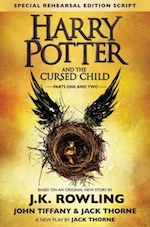 Harry had already briefly returned to the house where his family was killed before the final battle against Voldemort, a trip he made with Hermione Granger that resulted in their being attacked by Nagini and barely escaping with their lives. Years later, when his son Albus is at school, the reemergence of Time-Turner technology leads to another journey to Godric’s Hollow—but this time back to the exact day that his parents were murdered by the Dark Lord. Knowing that he can do nothing to stop the events from unfolding as they should (because Albus and his pal Scorpius Malfoy have already proved well enough that fussing with the timeline brings about tragedy), Harry watches the inevitable occur, braced by his family as he witnesses the event that shaped his entire life up close. Ultimately, the return becomes a cathartic thing that allows him to reconnect with Albus after a long period of feeling distant from his middle child.
Harry had already briefly returned to the house where his family was killed before the final battle against Voldemort, a trip he made with Hermione Granger that resulted in their being attacked by Nagini and barely escaping with their lives. Years later, when his son Albus is at school, the reemergence of Time-Turner technology leads to another journey to Godric’s Hollow—but this time back to the exact day that his parents were murdered by the Dark Lord. Knowing that he can do nothing to stop the events from unfolding as they should (because Albus and his pal Scorpius Malfoy have already proved well enough that fussing with the timeline brings about tragedy), Harry watches the inevitable occur, braced by his family as he witnesses the event that shaped his entire life up close. Ultimately, the return becomes a cathartic thing that allows him to reconnect with Albus after a long period of feeling distant from his middle child.
Lioness Rampant by Tamora Pierce
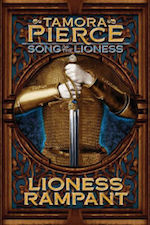 Shortly after being knighted, revealing that she has been masquerading as a boy for the past eight years, and killing the king’s nephew and heir apparent Duke Roger (in that order), Alanna flees the court of Tortall to escape all manner of gossip and potential accusations of outright treason. But seeing as she is the Lioness, her search for “me time” becomes more about quests: training young shamans of the Bazhir tribe, recovering the mythical Dominion Jewel, and choosing whether she loves the prince of the realm or the king of thieves. By the time she returns home to defend her right to knighthood, her sex is the least of anyone’s concerns—the court will recognize her prowess, so long as she can save them from encroaching enemy troops and a resurrected Roger before the throne falls into the wrong hands.
Shortly after being knighted, revealing that she has been masquerading as a boy for the past eight years, and killing the king’s nephew and heir apparent Duke Roger (in that order), Alanna flees the court of Tortall to escape all manner of gossip and potential accusations of outright treason. But seeing as she is the Lioness, her search for “me time” becomes more about quests: training young shamans of the Bazhir tribe, recovering the mythical Dominion Jewel, and choosing whether she loves the prince of the realm or the king of thieves. By the time she returns home to defend her right to knighthood, her sex is the least of anyone’s concerns—the court will recognize her prowess, so long as she can save them from encroaching enemy troops and a resurrected Roger before the throne falls into the wrong hands.
The Magicians by Lev Grossman
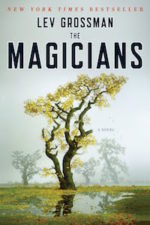 In The Magicians, Lev Grossman has a fittingly acerbic take on the idea that you can’t go home again. Rather than a dramatic homecoming, Quentin Coldwater returns to Brooklyn to find that none of his old friends are on winter break—naturally Brakebills’ schedules its vacation at odd times—so he doesn’t get to show off any of his knowledge, or make a big deal about how he’s not showing off his new knowledge. So he spends a week wandering around Brooklyn, being bored, avoiding his parents, and basically being exactly the same disaffected jerk he was before went to magic school.
In The Magicians, Lev Grossman has a fittingly acerbic take on the idea that you can’t go home again. Rather than a dramatic homecoming, Quentin Coldwater returns to Brooklyn to find that none of his old friends are on winter break—naturally Brakebills’ schedules its vacation at odd times—so he doesn’t get to show off any of his knowledge, or make a big deal about how he’s not showing off his new knowledge. So he spends a week wandering around Brooklyn, being bored, avoiding his parents, and basically being exactly the same disaffected jerk he was before went to magic school.
Neverwhere by Neil Gaiman
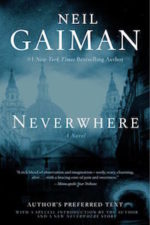 In Neverwhere, Neil Gaiman looks at the trope in two ways: What happens when home rejects you? What happens when you’ve simply outgrown it?
In Neverwhere, Neil Gaiman looks at the trope in two ways: What happens when home rejects you? What happens when you’ve simply outgrown it?
Richard Mayhew is a young Scottish businessman making a life in London, complete with a bland job, a bland apartment, and a shallow fiancée. His life is upended when he chooses to help an injured homeless girl. The girl, Door, is part of another world: London Below, a magical network of kingdoms and markets tied to the London Underground. And as Richard quickly discovers, contact with that world tarnishes you in the London Above. The citizens of London Above try not to see those of London Below, and when they do notice them, they assume that they’re homeless and (at best) chuck a pound or two at them but (usually) recoil in horror and disgust. Immediately after Richard helps Door, he discovers that people literally don’t see him anymore. His fiancée doesn’t hear him when he calls, his apartment is rented out from under him as he runs from room to room begging the realtor to stop, and a new guy is sitting at his desk at work. He is lost and terrified, and runs back to London Below in desperation. He rejoins Door and her group of friends, hoping that if he helps her complete her quest it will earn him his old life back. But that’s the funny thing about quests… as he travels through Below, proving himself and learning that he has hidden reserves of strength, he becomes less and less interested in going back. When he finally sees London Above again, it’s flat and colorless, and he soon admits that forcing himself back into his old life has made him miserable. But is it too late for another chance at life Below?
The Lord of the Rings by J.R.R. Tolkien
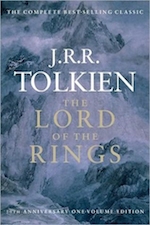 Perhaps the most painful homecoming of all, when the four hobbits of the Fellowship finally return home to their beloved Shire, they find that the place they’ve been dreaming of ever since setting foot out into the world has been overrun thanks to Saruman. So after saving the world, they must fight again to oust an evil man from their previously untouched homeland. It results in a new era for the Shire, and many of the future generations of halflings come out with blond hair, among other odd touches. But the real blow comes years later when Frodo, the Ringbearer, realizes that the Shire is no longer truly for him. He decides instead to sail into the west, for the shores of Valinor, to find some peace. After hundreds of pages, the Lord of the Rings epic takes its time meditating on the effect that war has on a people, and on a world. It warns against the expectation that anything can ever truly be the same once you have experienced such devastation, but reminds us of the hope that future generations bring.
Perhaps the most painful homecoming of all, when the four hobbits of the Fellowship finally return home to their beloved Shire, they find that the place they’ve been dreaming of ever since setting foot out into the world has been overrun thanks to Saruman. So after saving the world, they must fight again to oust an evil man from their previously untouched homeland. It results in a new era for the Shire, and many of the future generations of halflings come out with blond hair, among other odd touches. But the real blow comes years later when Frodo, the Ringbearer, realizes that the Shire is no longer truly for him. He decides instead to sail into the west, for the shores of Valinor, to find some peace. After hundreds of pages, the Lord of the Rings epic takes its time meditating on the effect that war has on a people, and on a world. It warns against the expectation that anything can ever truly be the same once you have experienced such devastation, but reminds us of the hope that future generations bring.










